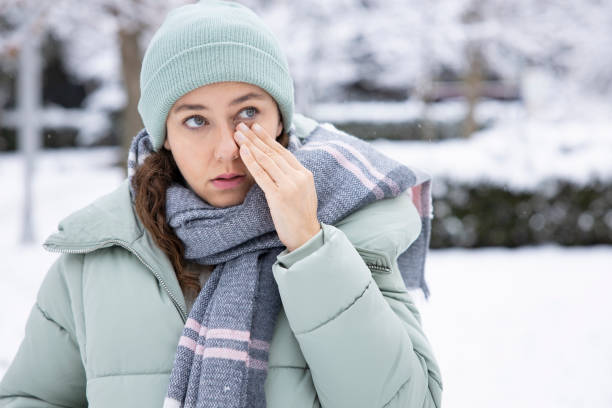The UK is experiencing a Cold Snap, with the Met Office warning that the North West, North East, and Yorkshire and Humber regions will experience extremely cold and dry weather. Carlo Buontempo of the ECMWF has advised that an extreme cold spell remains “very real” this winter. This sudden drop in temperatures has severe implications on eye health.
Cold Snap hitting the UK this Christmas with extremes in the North West, North East, and Yorkshire and Humber regions
Cost effective methods like paraffin heaters for heating homes may lead to a spike in eye health complaints this year due to a lack of moisture in the air
Extreme temperatures and clouded sun can cause tear ducts to dry up and lead to viruses and low levels of vitamin D
Carl Greatbanks, from Vision Direct warns:
“During the colder months, our eyes can start to suffer with symptoms of dry eye disease, tired or itchy eyes, light sensitivity, and blepharitis. Coupled with a reduced immune system and the intensification of viruses, we are less able to fight off bacterial infections, with a potential side-effect of winter ailments being viral conjunctivitis.”
Cold weather causing dry and painful eyes alongside blurred vision
In winter, more severe conditions like cold winds, dry heated rooms, and hot blowers in your car can lead to lower-quality tears and increase the intensity of dry, uncomfortable eyes, which can lead to diminished vision.
Carl also commented:
“Tears are created when we blink and should stay on the eye for around 10-15 seconds before a new one is formed.
“When they are of poor quality, they can break up after 3-5 seconds, leaving a period of dryness in between each one.
“As tears are used to facilitate a smooth gliding motion for your eyelids, when the surface is dry it can lead to your eyes feeling heavy, tired, and sore.
“When an optician creates your prescription, they are aiming to help light land at the back of your eye. This light will pass through lots of things such as the air, contact lenses, tears, and your cornea. If any of those things are altered then this will affect the process, meaning that a weakened tear film will effectively change your prescription.
“This could lead to a moment of blurred vision until you blink or rub your eyes and create a new layer of tears.”
Keeping your eyes healthy as the weather turns
| Dehumidifiers and heating regulation | Regulating the temperature in your house to ensure moisture retention is a must if you are experiencing eye-related-symptoms from a drop in temperature. This should help keep your eyes hydrated during winter. Failing this, consider using humidifiers when at home. You may also administer artificial tears and eye ointments that provide lubrication. Warm air causes dry eyes. You should avoid warm air directly on your eyes. Do not use the hairdryer in such a way that it blows the air into your eyes. Also, move the air vents of the car away from your face. |
| Avoid high levels of wind | Environmental conditions, such as wind and dry climates, can also decrease tear volume due to increased tear evaporation. |
| Wear sunglasses where appropriate | The sun tends to be lower in the sky during winter and this can cause difficulty seeing especially when driving, light sensitivity, and damage caused by UV rays. Try to make a habit of not only wearing sunglasses in the summer, but also the winter. You should wear sunglasses while outside of home during winter. |
| Wear sunglasses around snow | A further complication that could affect your vision is whether there’s snow on the ground. Snow reflects sunlight, which can make UV rays even more intense than in summer months. In fact, they could even cause photokeratitis, or a sunburn on your eyes. While it usually goes away within 48 hours, it can still cause redness, pain, swelling, and light sensitivity. The American Academy of Ophthalmologists recommends wearing goggles in winter to protect the eyes from harmful radiation during activities that include snow. |
| Stop rubbing your eyes | The winter season increases the risk of infection, so do not rub your eyes frequently, as it may cause infection. This goes alongside ensuring you remove makeup, washing your face before you go to bed, and avoid sharing facial products like makeup with others. |
| Healthy Diet | A healthy diet including foods with high omega-3 fatty acids can help in ocular moisturisation. This includes but isn’t limited to avocados, fish like mackerel and salmon, and chia seeds alongside omega-3 supplementations like cod-liver oil. Staying hydrated with 6-8 glasses of water a day will also be crucial to help with extreme weather. |
What to do if you contract conjunctivitis
Carl also advises that “Fortunately, both viral and bacterial conjunctivitis are self-limiting, and we usually resolve within 7 to 14 days without the need for treatment. However, bathing the eyes in warm water can help soothe some symptoms. If you do have bacterial conjunctivitis, you can visit your pharmacist for treatment if needed.”
